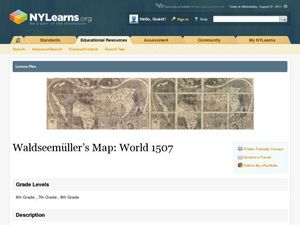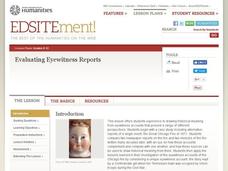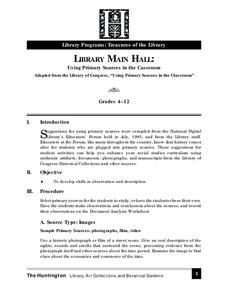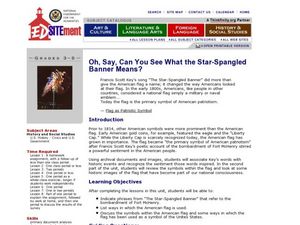University of California
Tenochtitlán
Behold, the Great Aztec empire! Scholars use primary sources to understand the impact of the Aztec city Tenochtitlan. Academics complete a worksheet and participate in group discussion to understand how Tenochtitlan was a melting pot for...
Curated OER
The Landscape of Luxembourg
Students create a nature journal for an imaginary trip around Luxembourg, including a visit to the Mullerthal region. They identify animals and plants that live in Luxembourg and describe its landscape. In addition, they summarize and...
Curated OER
The Netherlands
Students create a journal for an imaginary trip around the Netherlands. They identify animals and plants that live in the Netherlands and describe its landscape. In addition, they summarize and present historical information about an...
US National Archives
Eastern Europe 1939-45 — Ukraine
Was Joseph Stalin desperate or exaggerating the USSR's need for assistance on the Eastern Front in 1942? History students examine two differing opinions on Stalin's position and the reality of the Eastern Front just three years before...
DocsTeach
Celebrating America's Bicentennial in 1976
Budding historians learn the process of preserving history in an interesting hands-on-activity. The resource walks academics through the process of restoring the Declaration of Independence. Individuals place a series of images in...
Curated OER
Using Primary Source Documents in the Classroom
Students use primary documents to explore the past. They consider the source of the documents and identify and biases that the author may have held. They identify any questions about the historical event that may remain after reading the...
Curated OER
History According to Shakespeare
Middle schoolers read Shakespeare's, Julius Caesar while identifying a number of literary elements including simile, metaphor, personification, and hyperbole. As a response activity, they simulate a mock trial, and finally, compare and...
Curated OER
Waldseemüller’s Map: World 1507
Learners take a closer look at historical maps. For this primary source analysis lesson, students examine the first world map produced by Martin Waldseemuller. Learners complete the included map analysis worksheet and then write letters...
Curated OER
Analyzing the Lewis and Clark Journals
Learners examine and interpret Corps of Discovery journal entries as primary documents/sources providing insight into the Lewis and Clark expedition's journey. They present information they have documented on included activity sheet in...
Curated OER
Ben Franklin and the Rising Americans
Students prepare for and learn through a walking tour of Philadelphia. In this history instructional activity, students support their studies with a field trip. This instructional activity could be adapted to suit regions with other...
Curated OER
The Amistad Case
Students research the case of The Amistad and the individuals involved with the case. They write editorials, compare the movie version to actual historical documents and write a one-act play presenting their findings.
Curated OER
Just a Spoonful of Rights Makes the Responsibility Go 'Round
Students explore the concept of philanthropy. In this service learning lesson plan, students define rights and responsibilities. Students discuss the role of philanthropy in contributing to the common good. They also review historical...
Curated OER
A Walk Through the 20th Century
Students use primary and secondary sources to study the literature, historical events, people, technology, medicine, government, entertainment and culture of the decades of the twentieth century.
Curated OER
Quilt Codes
Young scholars list criteria to evaluate credible historical sources and defend their criteria in an essay. In this historical sources lesson plan, students review information of historical sources as well as the facts and pictures.
Curated OER
The Spread of Enlightenment Ideas
Looking for a simple and straightforward reference on the Enlightenment for your young historians? Check out this list of key terms and important figures from the period, followed by a traditional assessment where your learners will be...
PB Works
George Washington’s Socks: Short-Answer Questions Chapters 1-9
Build a literature unit around the book George Washington's Socks with this series of short answer questions. Broken up in two- and three-chapter increments, these reading comprehension questions allow young readers to demonstrate their...
Curated OER
Evaluating Eyewitness Reports
Learners consider the advantages and disadvantages of eyewitness accounts as records of history. They research several accounts of the Great Chicago Fire of 1871 and then compare and contrast each version to arrive at a final picture.
Curated OER
Using Primary Sources in the Classroom
Scholars study a historical photograph to make predictions of what happened right after the picture was taken. They research a variety of different topics and use primary sources to answer questions about common food, fashion trends, and...
Curated OER
Understanding Points of View
Investigate the importance of author's point of view. Young linguists study primary source documents related to the Treaty of Casco Bay. The first source is authored by the Native American Chiefs, the second by an English...
Curated OER
Oh, Say, Can You See What the Star-Spangled Banner Means?
Students research the historical inspiration for the lyrics of the "The Star Spangled Banner". They explore websites, read articles and analyze poetry in an examination of America's patriotic symbols and history.
Center for Civic Education
The Power of Nonviolence: Rosa Parks: A Quest for Equal Protection Under the Law
Teach young historians about the historical legacy of Rosa Parks with a multi-faceted lesson plan. Pupils follow stations and use journals to explore prominent events, analyze primary resource documents, and engage in interesting...
Curated OER
Neighborhood or Slum? Snapshots of Five Points: 1827-1867
How has your local neighborhood changed throughout recent history? Young researchers evaluate census data, images, and primary source descriptions describing the living situation in the antebellum Five Points neighborhood. They consider...
Curated OER
Slavery: Acts of Resistance
Historical accounts of various events have proven to differ depending on the point of view of the person documenting the event. Learners read and analyze two first person accounts of acts of slave resistance seen at a southern...
Curated OER
The Historical and Economic Impact of Military Bases in South Carolina
Eighth graders examine the history of South Carolina's military bases. In this South Carolina history lesson, 8th graders discover details about the history and economic impact of military bases in the state. Students analyze primary...

























